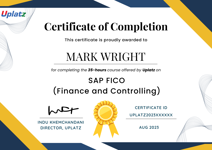
Oracle Consultant Career Path
Self-paced videos, Lifetime access, Study material, Certification prep, Technical support, Course Completion Certificate
Uplatz
Summary
- Uplatz Certificate of Completion - Free
Add to basket or enquire
Overview
Uplatz provides this comprehensive Career Path program on Oracle Consultant. It is a program covering all topics related to Oracle Consulting in the form of self-paced video tutorials. You will be awarded Course Completion Certificate at the end of the course.
This program will help you with skills that will surely put you on track to become a successful Oracle Consultant. Since Oracle Consultants are in huge demand due to high popularity of Oracle software & applications across organizations of all sizes, hence it can be a game-changer course for you.
The job an Oracle Consultant is to maintain data interfaces for Oracle applications. Evaluate database performance and provide architecture changes to improve quality and efficiency. Provide technical and functional support to project teams. Develop new business processes or enhance existing processes to improve business efficiency.
Courses included in Oracle Consultant Career Path Program are:
- Oracle Apex
- Oracle Apex Administration
- Oracle Forms
- Oracle BI Publisher
- Oracle PL /SQL
- Oracle DBA
- Oracle Multitenant DBA
- Oracle WebLogic Server
- Oracle ICS
Roles and Responsibilities of an Oracle Consultant:
- Communicate with customers and business leaders in requirements gathering and solution definition for assigned Oracle projects.
- Assist in all phase of project lifecycle to ensure quality and timely deliverables.
- Identify potential risks and develop mitigation strategies.
- Analyze and troubleshoot functional issues in a timely manner.
- Develop workflow processes and generate routine and ad-hoc project reports.
- Communicate project status to customers on regular basis.
- Provide support in developing and maintaining database applications.
- Assist in application design and code reviews and recommend improvements.
- Maintain data interfaces for Oracle applications.
- Evaluate database performance and provide architecture changes to improve quality and efficiency.
- Provide technical and functional support to project teams.
- Develop new business processes or enhance existing processes to improve business efficiency.
- Organize training for business units as needed.
In order to create and sustain a career in Oracle, it is necessary to have technical skills, which are hands-on experience or working knowledge in SQL & PL/ SQL, programming experience in core Java, fundamentals of Database concepts & workflow, familiarity with the Database Administration work, etc. Oracle also provides a variety of certifications for enhancing the profile of a person interested in pursuing a career in Oracle.
Experience in Oracle is always a wonderful career switch without any doubt. Oracle always comes with an excellent database management system, which is very supportive of the varieties programming language, especially in Java. Due to this big utilization, Oracle has planned and buy entire Java ecosystem from sun microsystem, and change sun java to oracle java. Only learning on SQL and PL/SQL is not enough if you really want to learn more about Oracle. Candidate should need to take some extra initiative for understanding and learning specifically on database administrator part which is the main attractive zone for the candidate who is willing to continue their great career in Oracle. There are different kind of certificates provided by the oracle on the database management system and Java.
The job an Oracle Consultant is to maintain data interfaces for Oracle applications. Evaluate database performance and provide architecture changes to improve quality and efficiency. Provide technical and functional support to project teams. Develop new business processes or enhance existing processes to improve business efficiency.
Roles and Responsibilities of an Oracle Consultant:
- Communicate with customers and business leaders in requirements gathering and solution definition for assigned Oracle projects.
- Assist in all phase of project lifecycle to ensure quality and timely deliverables.
- Identify potential risks and develop mitigation strategies.
- Analyze and troubleshoot functional issues in a timely manner.
- Develop workflow processes and generate routine and ad-hoc project reports.
- Communicate project status to customers on regular basis.
- Provide support in developing and maintaining database applications.
- Assist in application design and code reviews and recommend improvements.
- Maintain data interfaces for Oracle applications.
- Evaluate database performance and provide architecture changes to improve quality and efficiency.
- Provide technical and functional support to project teams.
- Develop new business processes or enhance existing processes to improve business efficiency.
- Organize trainings for business units as needed.
Course media
Resources
- Career Track - Oracle Consultant - Course Syllabus - download
Description
CAREER PATH – ORACLE CONSULTANT – COURSE SYLLABUS
Courses included in Oracle Consultant Career Path Program are:
1) Oracle Apex
2) Oracle Apex Administration
3) Oracle Forms
4) Oracle BI Publisher
5) Oracle PL /SQL
6) Oracle DBA
7) Oracle Multitenant DBA
8) Oracle WebLogic Server
9) Oracle ICS
Oracle APEX (Application Express)
Overall topics:
1. APEX Basics - Application, Pages and Regions
2. APEX Regions - Forms, Reports, Charts
3. User Interface, Templates and Themes
4. Creating Mobile Application
5. APEX Advanced - Security and Performance
Detailed-level course content:
1. Workspace
2. SQL Workshop
3. Application Builder
4. Form
5. Form with Report
6. Master-Detail Form
7. Classic Report
8. Interactive Report
9. Interactive Grid
10. Charts
11. Menus
12. Tree Region
13. Authentication
14. Authorization
15. Public Page
16. Templates
17. Theme
18. JavaScript in APEX
19. Dynamic Action
20. Validation
21. Computation
22. Page Process
23. Branches
24. Custom Process
25. Default Value
26. Shared Library
27. List of Values
28. Application Properties
29. Page Zero (Page0)
30. Performance
Oracle APEX Administration – Course Syllabus
• Overview of Oracle Application Express (APEX) Administration
• Installation of Windows 10 on Oracle Virtual Box
• Installation of Oracle 19c Database and Create Database
• Installation of Oracle APEX 20.1
• Installation of Tomcat
• Installation of ORDS
• Oracle APEX Admin Tasks
Oracle Forms
• Introduction to Oracle Forms
• Triggers and Alerts and Editors
• LOV and Record Group
• Master Detail Form
• Menu
• Visual Attribute and Property Class
• Program Units and PL-SQL Libraries
• Parameters
Oracle Forms is a component of Oracle Apps Middleware and is used for creating screens that interact with an Oracle database. It has an Integrated Development Environment (IDE) including an object navigator, code editor and property sheet that uses PL/SQL programming language.
Oracle Forms is a long-established technology to design and build enterprise applications quickly and efficiently. Many mid-to-large size enterprise applications across industries are built on Oracle Forms. Oracle Apps Forms/Templates and Reports module makes you understand the designing of reports and forms using Oracle Apps. Oracle Forms Developer is used to develop a form that can access an Oracle database and present the data. In summary, Oracle Forms is a layer of software for creating user interface (screens) that interact with an Oracle database.
This Oracle Forms course by Uplatz will teach you how to use Oracle Forms to design the front- end design and coding for back-end processing. You will be using PL/SQL programming to create Program units to process data held in Oracle database.
Oracle BI Publisher
1. Overview
2. Installation
3. General Navigation and Preference
• Create a new folder
• Uploading a Resource to Catalog
• Setting My Account Preferences
• Configuring Data Sources
• Creating a Data Model
4. Creating Reports
• Creating a new report
• Creating a report using report editor
• Viewing a report in interactive view
• Creating a Report Job
• Managing Report Job
• Connecting to an Email Server
• Inserting Gauge Chart or a Pivot Table
5. Reports using RTF Template
• Building RTF Template in offline mode
• Building an RTF Template in Online Model
• Using Template builder utility - Validate Template
• Using Template builder utility - Field Browser
• Using Template builder utility - Check Accessibility
6. Administering BI Publisher
Key Objectives of Oracle BI Publisher Training
• Understand and apply the uses and concepts of BI Publisher
• Create BI Publisher templates
• Create and maintain reports using BI Publisher Enterprise
• Create and run reports interactively
• Schedule and deliver reports to recipients
• Gain knowledge on X standards
• Create and apply templates for rich text format (RTF) and portable document format (PDF) formats
• Set up and configure enterprise server of BI Publisher
• Easily analyze data and schedule reports
• Explore advanced topics in BI Publisher
• Create reports effortlessly based on files, really simple syndication (RSS) feeds and web services
• Create data templates for eXtensible Markup Language (XML)
Oracle PL/SQL Course Syllabus
Description: Introduction
ORACLE PL-SQL PROGRAMMING - COURSE CONTENT
• Course Objectives
• Course Agenda
• Describe the ER Schema
• PL/SQL development environments available in this course
• Introduction to SQL Developer
Working with Oracle Cloud Exadata Express Cloud Service
• Introduction to Oracle Database Exadata Express Cloud Service
• Accessing Cloud Database using SQL Workshop
• Connecting to Exadata Express using Database Clients
Introduction to PL/SQL
• Overview of PL/SQL
• Identify the benefits of PL/SQL Subprograms
• Overview of the types of PL/SQL blocks
• Create a Simple Anonymous Block
• How to generate output from a PL/SQL Block?
Declare PL/SQL Variables
• List the different Types of Identifiers in a PL/SQL subprogram
• Usage of the Declarative Section to Define Identifiers
• Use variables to store data
• Identify Scalar Data Types
• The %TYPE Attribute
• What are Bind Variables?
• Sequences in PL/SQL Expressions
Write Anonymous PL/SQL Blocks
• Describe Basic PL/SQL Block Syntax Guidelines
• Learn to Comment the Code
• Deployment of SQL Functions in PL/SQL
• How to convert Data Types?
• Describe Nested Blocks
• Identify the Operators in PL/SQL
SQL Statements in a PL/SQL block
• Invoke SELECT Statements in PL/SQL
• Retrieve Data in PL/SQL
• SQL Cursor concept
• Avoid Errors by using Naming Conventions when using Retrieval and DML Statements
• Data Manipulation in the Server using PL/SQL
• Understand the SQL Cursor concept
• Use SQL Cursor Attributes to Obtain Feedback on DML
• Save and Discard Transactions
Control Structures
• Conditional processing using IF Statements
• Conditional processing using CASE Statements
• Describe simple Loop Statement
• Describe While Loop Statement
• Describe For Loop Statement
• Use the Continue Statement
Composite Data Types
• Use PL/SQL Records
• The %ROWTYPE Attribute
• Insert and Update with PL/SQL Records
• INDEX BY Tables
• Examine INDEX BY Table Methods
• Use INDEX BY Table of Records
(Complete course syllabus attached below)
Who is this course for?
Everyone
Requirements
Passion and zeal to achieve your goals!
Career path
- Oracle Consultant
- Oracle DBA
- Oracle Software Engineer
- Oracle Systems Analyst
- Oracle Apex Developer
- Oracle Developer - Forms and Reports
- Oracle PL/SQL Developer
- Oracle BI Developer
- Cloud Architect?/Oracle Cloud SaaS
- Oracle Cloud Fusion Engineer
- Oracle SOA Administrator
- WebLogic DBA
- Site Reliability Engineer, Fusion Middleware
- Oracle ODI and Analytics Developer
- Oracle Business Development Manager
Questions and answers
Currently there are no Q&As for this course. Be the first to ask a question.
Certificates
Uplatz Certificate of Completion
Digital certificate - Included
Course Completion Certificate by Uplatz
Reviews
Currently there are no reviews for this course. Be the first to leave a review.
Legal information
This course is advertised on reed.co.uk by the Course Provider, whose terms and conditions apply. Purchases are made directly from the Course Provider, and as such, content and materials are supplied by the Course Provider directly. Reed is acting as agent and not reseller in relation to this course. Reed's only responsibility is to facilitate your payment for the course. It is your responsibility to review and agree to the Course Provider's terms and conditions and satisfy yourself as to the suitability of the course you intend to purchase. Reed will not have any responsibility for the content of the course and/or associated materials.



